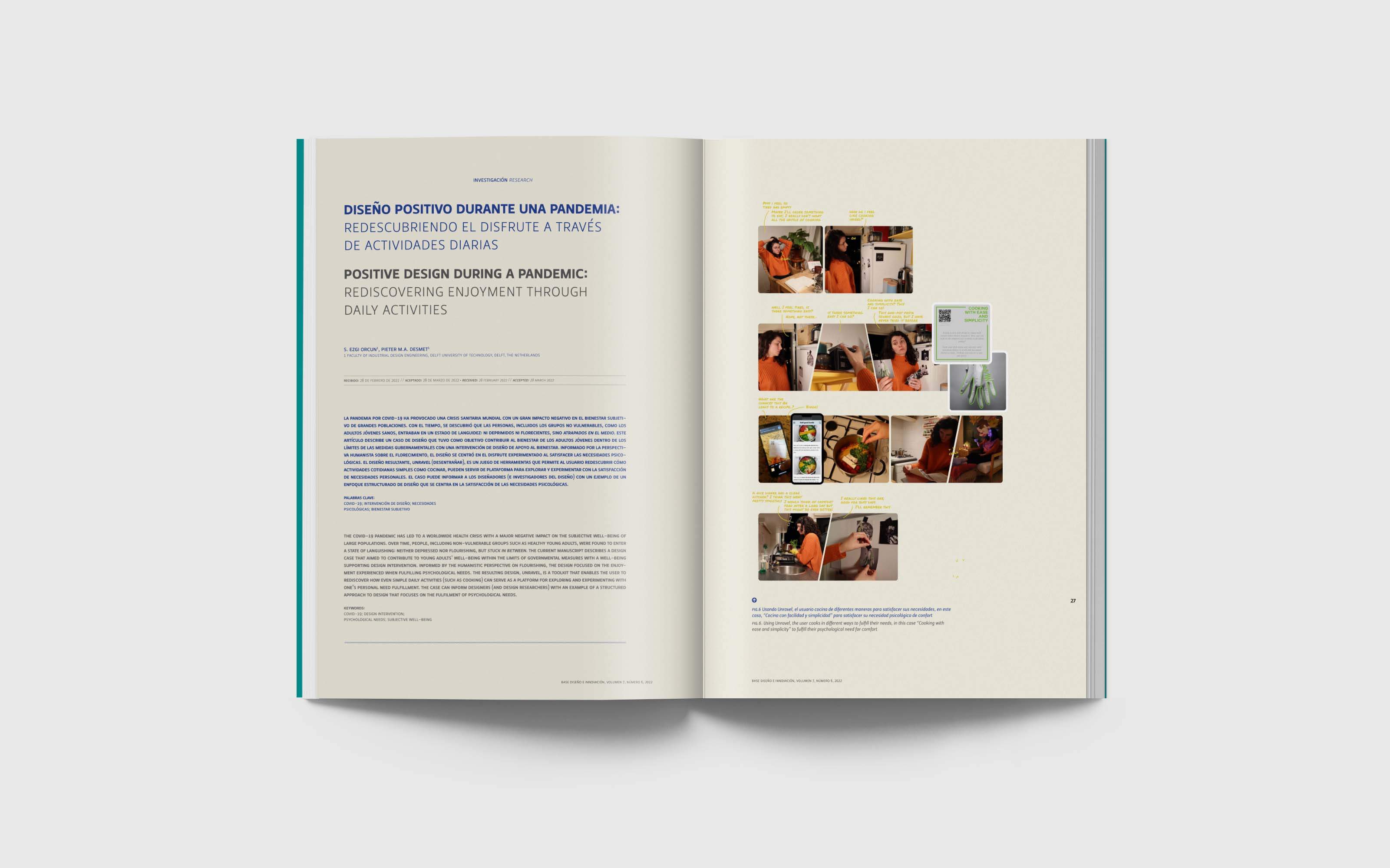Positive design during a pandemic Rediscovering enjoyment through daily activities
Main Article Content
Abstract
The COVID-19 pandemic has led to a worldwide health crisis with a major negative impact on the subjective well-being of large populations. Over time, people, including non-vulnerable groups such as healthy young adults, were found to enter a state of languishing: neither depressed nor flourishing, but ‘stuck in between’. The current manuscript describes a design case that aimed to contribute to young adults’ well-being within the limits of governmental measures with a well-being supporting design intervention. Informed by the humanistic perspective on flourishing, the design focused on the enjoyment experienced when fulfilling psychological needs. The resulting design, “Unravel”, is a toolkit that enables the user to rediscover how even simple daily activities (such as cooking) can serve as a platform for exploring and experimenting with one’s personal need fulfillment. The case can inform designers (and design researchers) with an example of a structured approach to design that focuses on the fulfilment of psychological needs.
Article Details
References
Balanzá–Martínez, V., Atienza–Carbonell, B., Kapczinski, F., & De Boni, R. B. (2020). Lifestyle behaviours during the COVID?19 – time to connect. Acta Psychiatrica Scandinavica 2020: 141, 399–400. https://doi.org/10.1111/acps.13177
Berg, J. (2021, 21 May). Younger Americans more likely to be languishing than older Americans. Ipsos U.S. Mental Health 2021 Report. Retrieved from https://www.ipsos.com/en-us/news-polls/ipsos-us-mental-health-2021-report
Desmet, P., & Fokkinga, S. (2020). Beyond Maslow’s pyramid: introducing a typology of thirteen fundamental needs for human-centered design. Multimodal Technologies and Interaction, 4(3), 38. https://doi.org/10.3390/mti4030038
Grant, A. (2021, May 5). There’s a Name for the Blah You’re Feeling: It’s Called Languishing. The New York Times. https://www.nytimes.com/2021/04/19/well/mind/covid-mental-health-languishing.html
Keyes, C. L. (2002). The Mental Health Continuum: From Languishing to Flourishing in Life. Journal of Health and Social Behavior, 43(2), 207–222. https://doi.org/10.2307/3090197.
Keyes, C. L. M. (2003). Complete mental health: An agenda for the 21st century. In C. L. M. Keyes & J. Haidt (Eds.), Flourishing: Positive psychology and the life well-lived (pp. 293–312). American Psychological Association. https://doi.org/10.1037/10594-013
Lyubomirsky, S., Sheldon, K. M., & Schkade, D. (2005). Pursuing Happiness: The Architecture of Sustainable Change. Review of General Psychology, 9(2), 111–131. https://doi.org/10.1037/1089-2680.9.2.111
Mascherini G, Catelan D, Pellegrini-Giampietro DE, Petri C, Scaletti C, Gulisano M (2021) Changes in physical activity levels, eating habits and psychological well-being during the Italian COVID-19 pandemic lockdown: Impact of socio-demographic factors on the Florentine academic population. PLoS ONE 16(5): e0252395. https://doi.org/10.1371/journal.pone.0252395
Maslow, A.H. (1987). Motivation and Personality, 3rd ed. Longman.
Orçun, E. (2021). Designing for Well-being in the context of Covid-19: Converting daily activities into [un]conscious pursuits of joy (Master Thesis). Delft: Technische Universiteit Delft.
Ruiz-Frutos, C., Ortega-Moreno, M., Allande-Cussó, R., Domínguez-Salas, S., Dias, A., & Gómez-Salgado, J. (2021). Health-related factors of psychological distress during the COVID-19 pandemic among non-health workers in Spain. Safety Science, 133, 104996. https://doi.org/10.1016/j.ssci.2020.104996
Sheldon, K. M., Elliot, A. J., Kim, Y., & Kasser, T. (2001). What is satisfying about satisfying events? Testing 10 candidate psychological needs. Journal of Personality and Social Psychology, 80(2), 325–339. https://doi.org/10.1037/0022-3514.80.2.325
Tay, L. & Diener, E. (2011). Needs and subjective well-being around the world. Journal of personality and social psychology, 101(2), 354–365.


